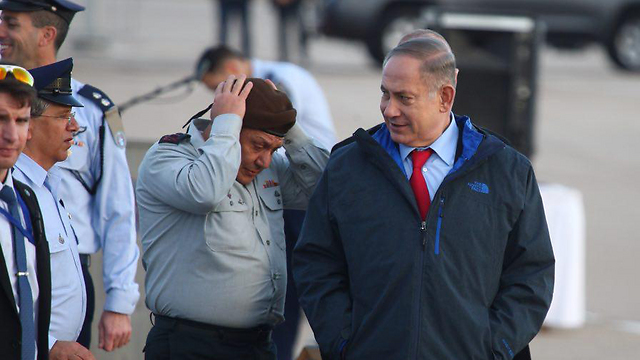
Lieutenant General Gadi Eisenkot. One of the best chiefs of staff in Israel's history
צילום: דובר צה"ל
Israel must not lose Eisenkot
Analysis: A major battle over the calls to pardon Elor Azaria is taking place behind the scenes between the chief of staff and Prime Minister Netanyahu, and it may also determine Eisenkot’s future in the IDF.
The court did not only rule on Sergeant Elor Azaria’s fate last week. its ruling may also decide the fate of the No. 1 soldier, and one of the best chiefs of staff in the State of Israel’s history, Lt. Gen. Gadi Eisenkot.
Three questions remained unanswered on the day after the powerful ruling handed down by the panel of judges led by Col. Maya Heller: regarding the punishment, regarding the pardon and regarding the chief of staff’s future.

Eisenkot and Netanyahu. Will the chief of staff’s term be extended by a fourth year? (Photo: Motti Kimchi) (צילום: מוטי קמחי)
On the one hand, Eisenkot can be satisfied with the outcome: The court explicitly ruled that the IDF’s values are just as the chief of staff defined them, and that the public atmosphere has no room in the rules of engagement. On the other hand, he may pay a heavy price for this victory – and not just because of the growing incitement against him and the prime minister’s weak condemnation of that incitement.
The punishment question: On January 15, the Military Court at the Kirya Base in Tel Aviv will begin the stage of argumentation of punishment for Azaria, who was convicted of killing a Palestinian terrorist in Hebron. The defense will likely present the request for a mitigated sentence, while the prosecution will present its demand for a prison sentence. It will be an explosive discussion, which is why the Judge Advocate General has already begun debating the issue, consulting senior legal experts and collecting opinions from senior figures in the Israeli society before specifying the required punishment.
The manslaughter offense allows the prosecution to demand a long jail term: The law states up to 20 years, but in light of the circumstances of this case, legal experts believe that a sentence of five years matches the “spirit” of the verdict. On the other hand, this will clearly create major public unrest, so the discussions are ongoing.
The Military Prosecution will likely not ask for an aggravated sentence which may ignite a commotion. It’s possible, therefore, that Chief Military Advocate General Brig. Gen. Sharon Afek and prosecutor Lt. Col. (res.) Nadav Weisman will seek to convey the message that “you won a clear legal victory – now use your heart.” In other words, now that the ethical message has been conveyed, there is no need to deepen the social rift and the prosecution should demand a mitigated sentence.
As the outcry of the masses cannot be swept away, it’s possible that the prosecution will not even mention a jail term, thereby signaling to the court that it will respect any punishment, even a mitigated one. This scenario, however, means that the hot potato will be tossed over to the court, and it’s safe to assume that the judges will not fall into this trap and will demand that the prosecution specify a clear number of years in jail.
The pardon question: The sentence decision is also overshadowed by the pardon issue. Although a matter-of-fact legal debate on this issue should be held between the professional elements in the army, a major battle is already taking place behind the scenes between the chief of staff and Prime Minister Benjamin Netanyahu, and it may end in a massive drama that will also determine Eisenkot’s future in the IDF by affecting the option of extending his term by a fourth year.
The question of Eisenkot’s future: The chief of staff will complete his second year in office in a month. Under the law, he has one more year left with an extension option, which is subject to the government’s approval. Eisenkot will likely not fight for another year and not ask for it. But if it is offered to him by the prime minister and Defense Minister Avigdor Lieberman, it is very likely that he will remain in office to complete the multi-year plan that he formed and implemented. As for Lieberman, it is pretty clear that he will support the extension, and he will likely not let Netanyahu harm the chief of staff.
A decision in principle on Eisenkot’s future should be made as soon as the coming summer, in order to allow the army to prepare accordingly. So far, he has served as an excellent chief of staff, some will say one of the best Israel has ever had: Modest, practical and a professional who leaves no stone in the army unturned in order to prepare the IDF for war in a way which no one before him has apparently done. In this framework, he builds a multi-year plan, fills up warehouses for times of emergency and approves – according to foreign reports – bold attacks in the heart of Syria, while keeping away from politics and mainly maintaining the IDF’s values.
Even if he did make a mistake with the unnecessary comment on the eve of Azaria’s verdict (“an 18-year-old soldier is not everyone’s child”), we must not forget his many qualities and we must not lose him over a slip of the tongue.










